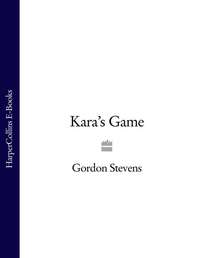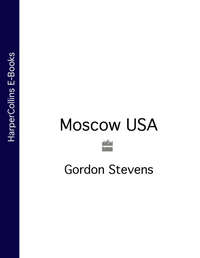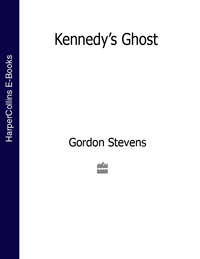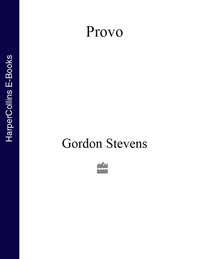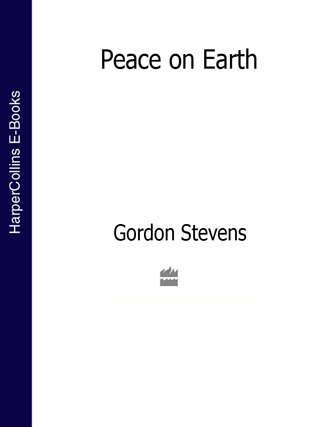
Полная версия
Peace on Earth
He had waited another ten minutes when the chauffeur reappeared, carrying a suitcase; with him was a middle-aged man, slightly balding, whom Walid Haddad recognised from photographs as the PLO representative in London. The driver put the case in the boot and opened the door for the delegate, thanked the policeman, put up his hand to the unmarked transit then pulled away.
No second man, thought Haddad, no bodyguard. Only the driver. Not that it would have done any of them any good.
He moved after the Granada, not wanting to be either too close or too far back, remembering the points before the motorway at which he could become separated from his target. The traffic lights at the roundabout before the tunnel were green, the driver of the car in front of him was lost, the man’s wife telling him what to do. The Granada was almost at the lights. Still green. He was getting too far back, tried to pull round the car in front, was cut off by an airport coach crowded with schoolchildren. The lights turned to red. He looked for the Granada, saw that it had also stopped, and breathed a sigh of relief.
The lights changed, he followed the cars down the slope and into the tunnel. The Granada was in the left-hand lane, not travelling as quickly as he had imagined it would; the airport coach was in the right-hand lane, pulling away. He drove out of the tunnel, turned right at the roundabout, and headed towards the M4. Nine miles, he began to think, nine miles in which he had to kill the PLO man and his chauffeur. It did not occur to him that they were Palestinians like himself. He passed the Trust House Forte Hotel on the left, drove round the roundabout beneath the motorway and turned back onto the M4 towards London. At the precise moment he did so he leaned forward and pressed the mileage counter. One mile, first bridge. The Granada picking up speed, the driver talking to his passenger. Not much traffic, even less traffic than before. The Granada pulled into the central lane and began accelerating. Two miles, A312 exit and second bridge. Never much time, almost a quarter the distance already gone.
In front he could see the airport bus, the one filled with children. Three miles, service station. The PLO driver was sticking to the speed limit, he suddenly thought, knowing he could not do it from behind, could not be caught in the traffic jam that would pile up behind the blast, knowing also that if he was too far in front he would not be able to check that the road round the Granada was clear. The airport bus moved into the inside lane, the Granada overtaking it. ‘Yallah,’ he urged the driver. ‘For the love of Allah, move it.’ Four miles, fourth bridge, the Granada pulling away from the coach. Ideally he would need half a mile between the coach and the car. Could do it with less, of course, could overtake and do it now. Run the risk of killing the kids. Kids had died before, would die again. Except his orders were specific – only the PLO man and his driver should die, no one else. Especially not a busload of kids, Nabil would have said.
Four miles gone, another five to do it.
Plenty of time, he told himself, not believing it, beginning to accelerate, preparing to overtake the Granada. The coach six hundred yards behind.
The sirens blasted in his ear. Instinctively he slowed down, saw the white police BMW level with him, lights flashing. He had been set up, he thought. The device was only six inches from his left hand. Do it anyway, he thought, get the PLO man. The Granada driver had heard, was slowing down. Fool, Haddad thought, he should be reacting, pulling his man out of trouble. Do it anyway, he thought again. Saw the coach. Alongside him. The children looking at him, waving at him. The Granada only twenty yards in front.
Five miles, fifth bridge, only four miles to go. He told himself to calm down, looked across at the police car, ignoring him, ignoring the Granada, already pulling away. Six miles, three-lane motorway into two lanes. Almost too bloody late. The Granada beginning to accelerate again. Not quickly enough, the coach still too close. The cameras, one facing west, the other east. Never much time, he thought, almost no time at all.
The blind spot, the two hundred yards between the cameras. He pulled the wheel violently to the left, and jerked the hire car across the inside lane, braking hard. Behind him the coach driver slammed on his brakes, the children tumbling forward. In his rear view mirror Haddad saw the coach suddenly fill the entire frame. The Granada was pulling away, three hundred yards, almost four hundred. Bloody drivers, the coach driver was shouting at him, waving his fist. The Granada five hundred yards away, nearly six hundred. The children picking themselves up from the floor. Madman, the driver was gesticulating at him, bloody loony. He changed into third, accelerating away from the coach. Seven miles, onto the flyover, the office blocks on either side. The Granada was three hundred yards ahead, two hundred. The road in front and behind clear. Almost out of distance, he thought, almost out of everything. Eight miles, off the flyover and past the Granada. A hundred yards, two hundred yards clear, closing on another group of cars. In his rear view mirror he could see the Granada clearly.
He reached across to the passenger’s seat and unfolded the newspaper.
* * *
Pan Am flight number PA1 arrived at John F. Kennedy Airport on time, taxied across the runway, and began disgorging its three hundred and fifty-two passengers into the terminal building. Three hundred and fifty-one of them were innocent citizens, the three hundred and fifty-second was Abu Nabil. By six thirty he had cleared immigration and customs, using the passport he had used in Paris and London, and taken a cab to the Plaza Hotel. He checked into his room, switched on the early evening news programme and made a single telephone call confirming his meeting for the following morning.
The third item oh the news bulletin was the assassination in London of the PLO spokesman Hassan Nabulsi. The report showed video pictures of the remains of the man’s Ford Granada motor car, on the M4 motorway near Heathrow Airport. He had just returned from a meeting with Yasser Arafat, the report continued, adding that unofficial sources had confirmed that the type of bomb used was believed to be identical to that used by the IRA in Northern Ireland. The reporter, standing at the side of the motorway, the wreckage of the car behind him, speculated that the assassination was the latest episode in the struggle for supremacy within the various factions of the Palestinian movement. More sinister, he suggested, his collar turned up against the biting wind and the first cutting flakes of sleet, was the possibility of a link-up between the IRA and one of the extremist Palestinian groups.
If Haddad was to end it, Nabil had thought to himself in Damascus, then Haddad may as well start it. He flicked between the channels, catching the same report on CBS and NBC. Haddad had now started it.
He showered, took a light supper of cold meats and salad, and went to bed.
He woke at four, a combination of the time difference between Damascus, London and New York, and the air conditioning, which he found oppressive, slept fitfully for another two hours and rose at six. He left the hotel and spent the next ninety minutes walking the streets. The weather was brisk and cold. On the corner of Times Square he bought copies of the New York Times, the International Herald Tribune and the Wall Street Journal.
He was getting hungry. In a delicatessen six blocks from the hotel he took lox and bagels, sitting in the seat farthest from the window. The service was friendly, he wondered for the briefest of moments what the shabab, the boys, would have thought, how the owners would have reacted, if they had known that he, Abu Nabil, planner of death, executioner of violence, survivor of at least three Israeli attempts on his life, was breakfasting in a Jewish deli in New York, served by a smiling Jewish waiter whom he called David and whom, as he left, he would tip and who would tell him to have a good day. His battle, however, had never been personal. Besides, the lox was good and the second cup of coffee was free. And the place was warm and crowded. He thought, not for the first time that day, of the photograph he had again left in the emptiness of his flat in Damascus and turned to the newspapers.
The assassination in London featured on the front pages of both the Times and Tribune and the international page of the Journal. On the front page of the Herald Tribune there was also a photograph, taken two nights before, of the moment in Northern Ireland when a British soldier had saved the life of the son of a leading member of the IRA. The British government, the article said, had declined to comment on press speculation that the soldier concerned had been a member of the Special Air Service, the SAS.
The waiter refilled his cup. He drank it slowly then rose to leave, paying the bill and leaving a good tip. As he left, the man he had called David told him to have a good day.
At eight thirty that morning, Paris time, the head of arms sales for the French government, General René Audran, was shot dead at his home outside Paris. An hour later, in a communiqué to the Paris and Rome offices of Agence France Presse, responsibility was claimed jointly by Action Directe and the Red Brigades. Forensic tests conducted within twenty four hours established that the weapon used appeared to match that used in the murder of a magistrate in Turin the preceding August.
Two hours later a West German industrialist, Hans Martin Schneider, was murdered when he answered the door to an attractive young woman claiming to be a friend of his daughter.
In the next forty-eight hours there were bombings in West Germany and Belgium; in West Germany the targets were the American companies of Litton, MAN and Honeywell in that order; in Belgium the targets were the American companies of Litton, MAN and Honeywell, also in that order. In all the attacks, it was suggested, the explosives came from the same source: 816 kilos of plastic explosives stolen at Ecoussines, in Belgium, six months before.
The meeting with the industrialist Ahmad Hussein was at ten; it was almost seven weeks since they had met on the quai at St Germain-en-Laye, on the outskirts of Paris. Nabil walked to Macy’s, enjoying the Christmas decorations, and bought two gifts, one of them a chess set, asking for both to be wrapped, then took a cab to the block which housed the offices of the businessman. His host was waiting. He poured them coffee from a percolator in the corner and asked whether Nabil had breakfasted. Nabil confirmed that he had without saying where.
The room was comfortable, well furnished, a Persian rug on the floor and three paintings of Jerusalem by Suleiman Mansour on the walls.
‘A sad affair in London,’ Hussein suggested, handing Nabil a coffee.
‘A sad affair indeed.’
For the next ten minutes they discussed the implications of the London assassination; when they had finished Hussein unlocked the top right drawer of his desk and took a file from it.
‘In January,’ the industrialist began, establishing the background, ‘Ronald Reagan will officially begin his second term as president of the United States. He will be seventy-four years old when he starts, seventy-eight at the end. For reasons of his age, and because he cannot, under the Constitution, hold office for a third term, many people believe the next four years will be what Americans like to call a lame-duck presidency.’ He paused. ‘In Paris, we agreed this would not be the case. In Paris, we agreed that, partly because of his own background, partly because it is what every president wants, Reagan will seek to do something that will allow him to go down in history. In Paris,’ he concluded, ‘we also agreed that the obvious area is foreign policy. Within this, we agreed, Central America was too controversial, too many comparisons with Vietnam. The obvious area, therefore, other than any agreement with the new Russian leadership, was the Middle East.’
He moved the file to the centre of the desk.
‘You wanted two names. Firstly, the name of the man who will be the president’s foreign policy advisor in the foreseeable future, the man who would run his Middle East policy for him, who would do the negotiations. Secondly, you wanted the name of the person most likely to have influence with that man.’
He opened the file. ‘As regards the first,’ he said, ‘there are three possibilities. The first, and luckily for us not the favourite, is pro-Israeli, strong connections with the Jewish Lobby here.’ Nabil listened intently. ‘The second,’ continued Hussein, ‘would be a strong candidate, except that his wife is seriously ill. It may be that she recovers by the dates we are discussing, it may also be that she is no longer with us.’ His voice had dropped slightly. ‘In which case,’ he said, ‘the man in question might have both the time and motivation to do something.’
‘But?’
‘But he would be preoccupied with his wife’s illness during the lead-up to that period, during the time he would have to be convinced that he wanted the job and others persuaded that he was the man for it.’
‘And the third candidate?’
Hussein pulled a photograph from the file and handed it to Nabil. ‘Henry Armstrong is fifty-six years old. He was associated with Reagan, albeit at a distance, when the president was governor of California, he is also reported to have had links with George Bush when the vice president was head of the CIA.’
‘Does that go against us?’
Hussein shook his head. ‘Henry Armstrong is a wealthy man, a prominent businessman, a success in his own right. Fortunately for us, he is also a very practical man. His companies have close connections with companies in the Middle East, Arab companies.’
‘How will you manage it?’ asked Nabil.
Hussein looked up from his coffee. ‘I have already started,’ he smiled, knowing Nabil wanted to know more. ‘A little financial backing where necessary,’ he began to explain, ‘sometimes a long way from the target itself, even from the people who will have influence when it matters, but to the people who will influence those people.’ He laughed. ‘Sometimes you don’t even say he’s a good man to have around, sometimes it’s better to say he’s a real bastard and the last man they should let anywhere near the Oval office.’ His eyes gleamed at the thought.
‘So Henry Armstrong will be the next major foreign affairs negotiator for the United States of America?’
‘Yes.’
Nabil leaned forward and turned the photograph of Henry Armstrong face down on the desk. Not from disdain or disrespect, but from habit. ‘And who will be the catalyst?’ he asked. ‘Who will be the man who will have his ear?’
Hussein took a second sheet of paper from the file. Attached to it was another photograph and a cutting from a newspaper.
‘The Jacksonian Institute is a political think tank in Washington. It is highly respected, both nationally and internationally, with considerable justification. Henry Armstrong is a regular contributor to its foreign affairs seminars, he is also a major benefactor of the institute.’ He smiled again. ‘Most things in America are, of course, tax deductible.’
‘That aside the institute plays an important role in Armstrong’s life. It is one of the reasons he must be considered in line for a top post in government.’ Nabil heard the words and knew that Armstrong was the man he wanted, wondering whether Hussein’s second choice would be as good as his first. ‘Each year,’ continued the industrialist, ‘the institute hosts a number of international forums to which guest speakers from various parts of the world are invited. Several years ago Armstrong himself chaired a seminar on strategic politics at which one of the guest speakers was this man.’ He unclipped the photograph from the sheet of paper in front of him and passed it to Nabil. The man in it was in his late thirties, good-looking, immaculately groomed. ‘The speaker was a British Member of Parliament, one of the up and coming breed who seem set to control things in the future. Armstrong was so impressed that he invited him back. They are now close friends.’
‘How important was he?’
‘He wasn’t important then, he is important now, he will be extremely important in the future.’ He passed Nabil the sheet of paper with the newspaper cutting fastened to it.
Nabil took it. ‘What do you mean?’ he asked.
Hussein looked at him. ‘John Kenshaw-Taylor entered the British Parliament in a bye-election in 1978 after a successful career in the City. Like others of his kind, it was important to him that he was seen to make his first million by the time he was thirty. Politics, in any case, was always a strong possibility for him; his family has had its hands on British foreign affairs for most of the past half-century, probably well before that. Since 1978 his rise has been spectacular. Two years ago he was made Minister of Energy.’
Nabil knew there was more.
‘Eight weeks ago he was promoted to Number Two at the British Foreign Office. The day he moved, the London Times said it was merely one more step to his becoming Prime Minister.’
Nabil looked at the dates on the newspaper cutting Ahmad Hussein had given him. The day, he thought, that he had seen the article which had planted the first seed of the plan in his mind, the day he had played tawli with the old man in the café. The day, he did not know, that Yakov Zubko and his family had left Moscow and begun their journey to the West.
‘How can we get at him?’ he asked.
‘He’s ambitious,’ Hussein replied, equally succinctly.
The meeting finished at twelve. At twelve thirty Hussein drove them to a Lebanese restaurant where they ate a quiet and discreet lunch. When they parted, Nabil gave him the gifts he had bought for his children; that night Hussein gave them to his son and daughter; when they asked who they were from, he told them they were from an uncle who loved them very much but whom they had never met. His wife knew not to ask.
At four thirty that afternoon Nabil made a single international telephone call, checked out of the Plaza Hotel, took a cab to John F. Kennedy, and caught the six forty-five TWA flight to Rome.
CHAPTER THREE
The sherry was manzanilla. He had a standing order for it from Green’s in the City and kept it chilled in a walnut cabinet in the corner of the office.
‘If this is how a bad day ends, Minister, how do we end a good one?’ The civil servant’s question was only half a joke. For the first time since he had taken office the Foreign Minister had sent back a briefing with a request that it should contain more information.
John Kenshaw-Taylor sat down on the edge of his desk. ‘Edward,’ the Under-Secretary was his senior by at least fifteen years, ‘you know I will always take your advice, as long as you make me think it was my idea in the first place.’
The man called Edward smiled. ‘Precisely, Minister.’
The exchange had cleared the air, they settled back into the chesterfields and relaxed.
It was the way Kenshaw-Taylor had always anticipated ending each day at the Foreign Office, a quality he considered the other newer members of the government lacked, a style, in addition to his ability to digest a brief and reproduce it with maximum impact in the House or in cabinet committee, that had already marked him out in the minds of the Whitehall mandarins as the man to watch, the one who would get to the top.
The lighting in the room on the third floor overlooking Horse Guards Parade was subdued, in the semi-gloom he could see the outlines of the mementoes he had brought with him from the sanitised corridors of the Department of Energy. None of them referred to himself, at least not directly. On the left of the antique clock on the wall facing his desk was a portrait of his grandfather, below it a letter signed personally by George V. On the wall to the left of the desk, an original newspaper report of the Balfour Declaration, to which the same grandfather had been an advisor, in the gloom to the right a black and white photograph of his father standing behind the seated figures of Churchill, Roosevelt and Stalin at Yalta in 1945.
John Kenshaw-Taylor had dreamt of the Foreign Office, had savoured its charisma and its power, ever since his father had brought him there when he was eight years old. He had taken it with him when he returned to his prep school that evening, held on to it through Eton and Oxford, even during his days in the City, when his natural instincts, as well as his undoubted connections, had amassed him a considerable personal wealth. He remembered the decision to enter politics, the bye-election, his first ministerial post, remembered above all the evening a few short weeks ago, the telephone call inviting him to see the Prime Minister at Number Ten, the suggestion that he should leave Energy and take over as Number Two at the Foreign Office. He sipped the manzanilla and looked at the winter sky gathering outside the window. What a way to start Christmas, he thought, recalling his first day in the building itself, the portraits, their oils glinting in the strange light which seemed to stalk the corridors, the images of the men who had directed the nation’s course and its relationship with the rest of the world, the men who had led the nation itself.
‘Thank you, Minister.’ The Under-Secretary rose to leave, placing his glass on the silver tray on the side. ‘Perhaps it has been a good day after all.’ He meant it. For forty years, the British Foreign Office had presided over the dissolution of an empire; after the Falklands campaign, it had been said by some, even the Prime Minister had seen fit to question what remained of its role on the world stage. The new minister, the civil servant felt, was not long for the Number Two job, and when he was at the top, things would change. An old wind blowing through the corridors, someone had remarked. ‘Thank you, Minister,’ he said again.
Kenshaw-Taylor watched the man leave, staring for a few moments out of the window, looking through the darkness towards Buckingham Palace, then turned back to his desk. Kenshaw-Taylor’s mind was the epitome of clarity and logic. He took pride not only in organising to the last degree whatever he was doing, but in sticking to it, whether in the day-to-day management of his personal affairs, or the advancement of his political career.
It was seven fifteen. He picked up the telephone and dialled his home in the country; the phone rang for thirty seconds before his wife answered. ‘Samantha, darling, it’s me.’ They talked for ten minutes about what she had done that day, what he had done. That evening, because of his commitments in London, she was due to open the Christmas fayre at the village hall in his stead; tomorrow, she reminded him, the children would be home from school. He assured her he would be back by the following afternoon, and that he was looking forward to Christmas. She said she was already late and would have to go. ‘OK, darling. Love you. Bye.’
He put the phone down and turned his attention to the despatch boxes. Three to get through. He already knew what they contained and worked out his timetable for the evening. One hour on the first box, the reception he had to attend for fifty minutes, a couple of hours in the flat to finish off the other two. Thank God he wasn’t still at Energy, the midnight meetings about the miners’ strike, the problems about the instability of North Sea oil prices. The move had come just at the right time, and to the right department, kept him away from the law and order problems at the Home Office and the financial worries at the Exchequer.
He was in an enviable position, he knew, not just because he was in the Foreign Office, but because of his position within it, aware that he would look back on these days with just a tinge of nostalgia. His hands were on the first trappings of power, real power, but he was still far enough from that power not to be encumbered with its disadvantages. He could still take his wife to dinner, could still go Christmas shopping with the children without the armed bodyguards who were always just a pace away from his senior colleagues. He could ask his driver to wait for him, or he could tell the man to drop the despatch boxes at his flat and make his own way home.


